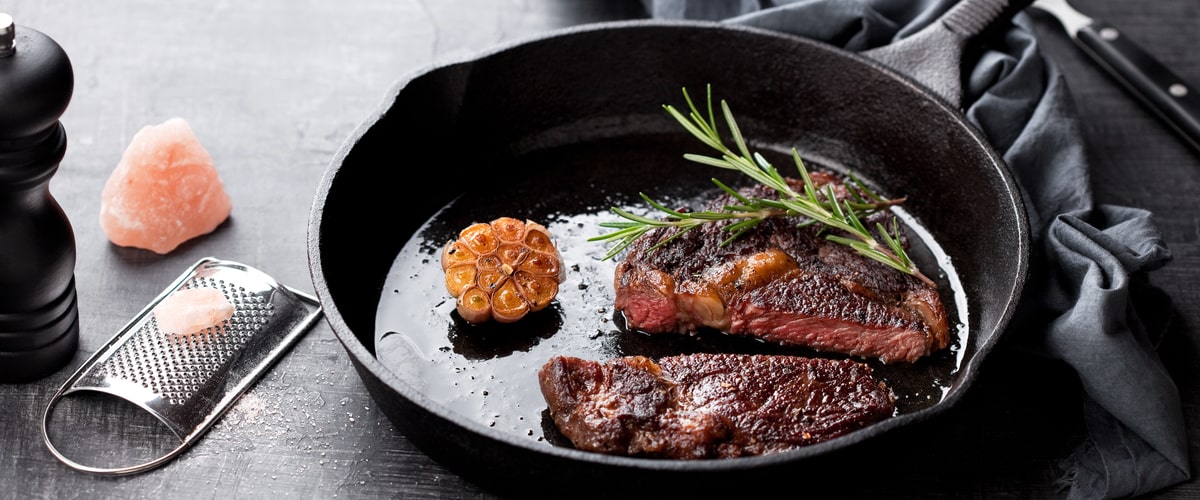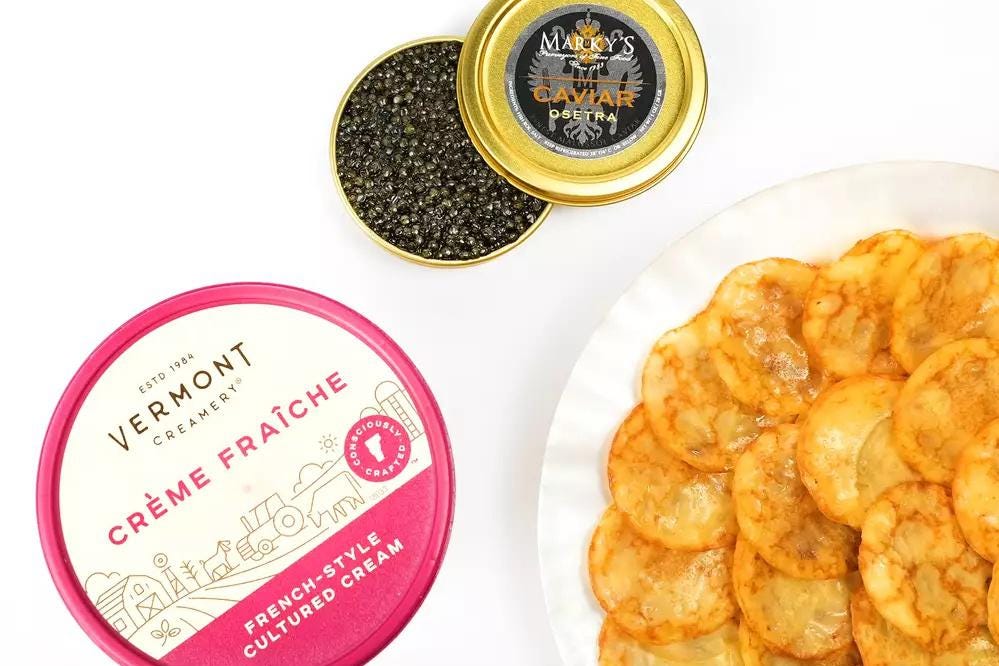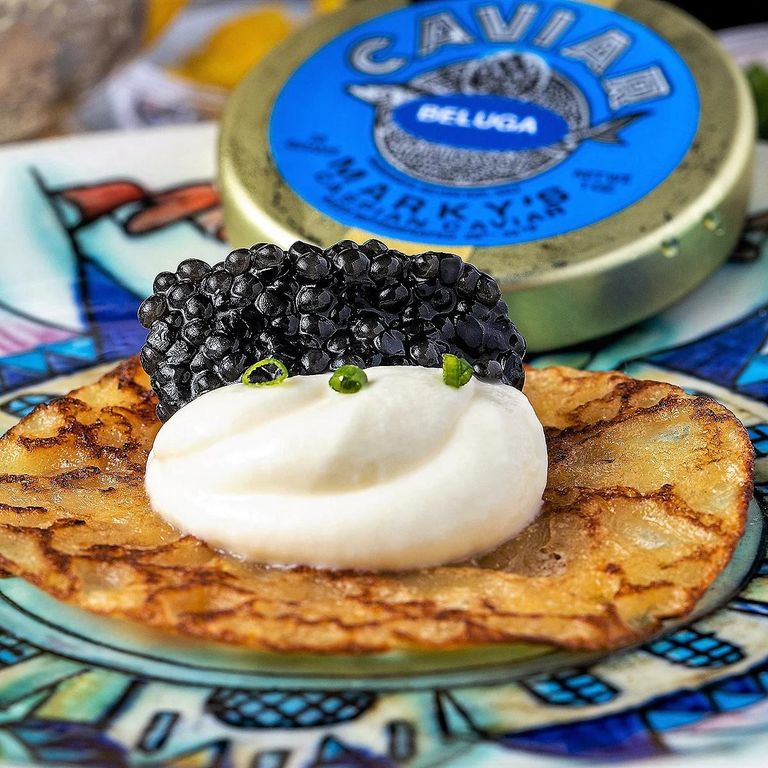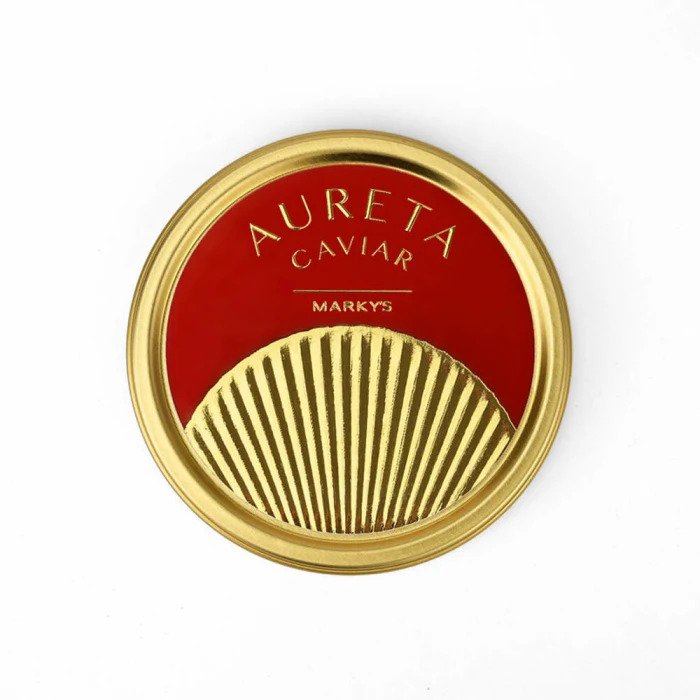The Secrets of Perfectly Seasoned Cast Iron Skillets: Care and Cooking Tips
Category : Food Stories, Party Ideas, Recipes, Press Room |
Posted : Jul 24, 2023
Do you want to take your cooking skills to the next level? An integral part of any chef's toolkit should be a perfectly seasoned cast iron skillet. Not only does cast iron cook food beautifully, but its seasoning is key for locking in flavor and preventing sticking. So how do you get that metal slicked with oil and golden brown? In this blog post, we'll go over why seasoning is important for all levels of home chefs looking to make a perfect meal every time. We’ll discuss the science behind maintaining an optimal layer of seasoning on your cast iron skillet, as well as tips on how to care for it properly so it’s ready for whatever flavors you throw at it!
The Basics of Cast Iron Skillet Care

Cast iron skillets are prized possessions in many kitchens, but maintaining them properly can be a challenge. With the right care, these skillets can last for generations and become even more non-stick over time. The first step in caring for your cast iron skillet is to properly season it. This involves coating the skillet with a thin layer of oil and heating it until the oil polymerizes, creating a non-stick surface. After each use, it's important to clean the skillet with hot water and a gentle scrub brush, avoiding soap that can strip away the seasoning. Drying the skillet thoroughly and applying a light coat of oil will help prevent rust and maintain its non-stick properties. With these tips in mind, you can confidently care for your cast iron skillet and enjoy its many benefits for years to come.
Tips for Seasoning a Cast Iron Skillet
A well-seasoned cast iron skillet is a true kitchen workhorse. Not only does it provide excellent heat retention and distribution, but it lasts for generations. If you're new to cast iron cooking, seasoning your skillet may seem daunting. However, with a few simple tips, it's easy to achieve a non-stick, rust-resistant surface that will stand the test of time. The key is to start with a clean and dry skillet, then apply a thin layer of oil or fat. Next, bake the skillet in the oven, letting the seasoning develop over time. It's important to avoid soap and water when cleaning a cast iron skillet, as this can strip the seasoning. With a little love and care, your cast iron skillet will become a treasured part of your kitchen.
Tips for Caring for Your Cast Iron Skillet During Cooking
Cooking with a cast iron skillet can be a game-changer in the kitchen. But, like any tool, it requires proper care to ensure it lasts for years to come. One important tip is to avoid using soap when cleaning your cast iron skillet, as it can strip away the seasoning that makes it non-stick. Instead, simply rinse with hot water and use a brush to remove any stubborn bits. Another key element of caring for a cast iron skillet is to make sure it is completely dry before storing it, as moisture can lead to rust. Lastly, don't be afraid to re-season your skillet as needed, which involves coating it in a thin layer of oil and baking it in the oven to create a protective layer. By following these tips, you'll be able to enjoy the benefits of cooking with a cast iron skillet for years to come.
Different Ways to Cook with a Cast Iron Skillet
Cooking with a cast iron skillet is like having a reliable and loyal companion in your kitchen. Whether you’re making breakfast, lunch, dinner, or even dessert, this trusty piece of cookware can handle just about anything. From searing a perfectly cooked steak to baking a delicious cornbread, the versatility of a cast iron skillet knows no bounds. Its ability to evenly distribute heat ensures that your food is cooked to perfection every time, leaving you with a crisp crust and tender center. So, whether you’re new to cooking with cast iron or a seasoned pro, there are endless ways to elevate your meals with this timeless tool. Don’t be afraid to experiment and discover all the different ways you can use your cast iron skillet to create delicious and memorable dishes.
Troubleshooting Common Problems With Cast Iron Skillets
As a cast iron skillet enthusiast, there's nothing more disappointing than experiencing issues with my trusty cookware. But fear not fellow cast iron fans, as troubleshooting common problems is easier than you may think! One of the most frequent issues faced is food sticking to the surface, which can be resolved by properly seasoning your skillet and ensuring it reaches a sufficient temperature before cooking. Another annoying problem is rust, but this can be combated with regular cleaning and drying after each use. And if you find your skillet is smoking excessively, it could be due to a buildup of oil or food residue, easily remedied with a quick scrub and reseasoning. By following these tips and tricks, you'll be able to tackle common cast iron skillet problems with confidence and keep cooking up a storm with your favorite pan.
Five Delicious Recipes to Try in Your Cast Iron Skillet
Cooking in cast iron skillets is a time-honored tradition that goes back generations. Not only do they give your dishes mouth-watering flavor, but they also distribute heat evenly, making them crucial in any kitchen. Here are five delicious recipes to try in your trusty cast iron skillet
Savory Veggie and Cheese Frittata
Ingredients:
- 6 large eggs
- 1/4 cup heavy cream
- 1 teaspoon salt
- 1/2 teaspoon freshly ground black pepper
- 2 tablespoons olive oil
- 1 small onion, diced
- 1 red bell pepper, diced
- 2 cloves garlic, minced
- 1 cup spinach, roughly chopped
- 1/2 cup cheddar cheese, grated
Instructions:
- Preheat oven to 350°F and grease a 10-inch cast iron skillet with butter or nonstick cooking spray.
- In a large bowl, whisk together the eggs, cream, salt, and pepper.
- Heat the olive oil in the cast iron skillet over medium heat. Add the onion, bell pepper, and garlic and cook until softened, about 5 minutes.
- Add in the spinach and cook until wilted, about 3 minutes.
- Pour the egg mixture into the skillet and stir to combine with the vegetables.
- Sprinkle the cheddar cheese over the top of the frittata.
- Transfer to preheated oven and bake for 20 minutes, or until a toothpick inserted in center comes out clean.
- Allow to cool before slicing and serving. Enjoy!
Skillet Chocolate Chip Cookie
Ingredients:
- 1/2 cup (1 stick) butter, melted and cooled slightly
- 3/4 cup brown sugar
- 1/4 cup granulated sugar
- 1 teaspoon vanilla extract
- 2 large eggs
- 2 cups all-purpose flour
- 1 teaspoon baking soda
- ½ teaspoon salt
- 2 cups semi-sweet chocolate chips
Instructions:
- Preheat oven to 350°F and grease a 12-inch cast iron skillet with butter or cooking spray.
- In a medium bowl, whisk together the melted butter and sugars until smooth. Add in the vanilla and eggs until fully incorporated.
- In a separate bowl, combine the flour, baking soda and salt. Gradually add to the wet ingredients until everything is well combined.
- Fold in the chocolate chips, then pour into pre-prepared cast iron skillet and spread evenly with a spatula.
- Bake for 20-25 minutes or until golden brown on top and a toothpick inserted in center comes out clean.
- Let cool for 10 minutes before serving warm with ice cream or topping of choice! Enjoy!
Crispy Fried Chicken
Ingredients:
- 2-4 chicken drumsticks or thighs
- 1 cup all-purpose flour
- 1 teaspoon garlic powder
- 1 teaspoon paprika
- ½ teaspoon salt
- ¼ teaspoon freshly ground black pepper
- ¼ cup buttermilk (or regular milk)
- 2 tablespoons hot sauce (optional)
- Vegetable oil, for frying
Instructions:
- In a large bowl, combine the flour, garlic powder, paprika, salt and pepper.
- In a separate bowl or shallow dish, whisk together the buttermilk (or regular milk) and hot sauce until combined.
- Dip each piece of chicken into the buttermilk mixture to coat evenly, then transfer to the flour mixture and toss to coat completely on all sides.
- Heat 2-3 tablespoons of vegetable oil in a 12-inch cast iron skillet over medium heat until shimmering.
- Carefully add in the chicken pieces to the pan and cook for 4-5 minutes per side or until golden brown and cooked through (internal temperature should reach 165°F).
- Transfer to a paper towel-lined plate and let cool slightly before serving. Enjoy!
- Serve with your favorite sides for an unforgettable meal! Enjoy!
Cheesy Garlic Bread
Ingredients:
- 2 tablespoons butter, melted
- 1/4 cup olive oil
- 3 cloves garlic, minced
- 1 teaspoon Italian seasoning
- 1 teaspoon red pepper flakes (optional)
- 1 loaf French or Italian bread, cut into 8 slices
- 1 cup shredded mozzarella cheese
Instructions:
- Preheat oven to 400°F and grease a 12-inch cast iron skillet with butter or cooking spray.
- In a small bowl, whisk together the melted butter, olive oil, garlic, Italian seasoning and red pepper flakes.
- Place slices of bread in prepared skillet and brush generously with the butter mixture on both sides.
- Bake for 8-10 minutes or until golden brown on top and crisp around edges.
- Remove from oven and sprinkle mozzarella cheese over the top of each slice of bread.
- Return to oven and bake for an additional 5-7 minutes or until cheese is melted and bubbly. Serve warm! Enjoy!
Breakfast Hash
Ingredients:
- 2 tablespoons olive oil
- 1 small onion, diced
- 1 bell pepper, diced
- 4 cloves garlic, minced
- 2 large potatoes, cubed
- 1 teaspoon smoked paprika
- ½ teaspoon salt
- Heat the olive oil in a 12-inch cast iron skillet over medium heat. Add the onion, bell pepper and garlic and cook until softened, about 5 minutes.
- Add in the potatoes, smoked paprika and salt and cook for an additional 10 minutes or until the potatoes are fork-tender.
- Reduce heat to low and cover skillet with lid. Cook for an additional 5 minutes or until desired crispness is reached. Serve warm! Enjoy!
Classic Cornbread
Ingredients:
- 1 cup cornmeal
- 1 cup all-purpose flour
- ¼ cup granulated sugar
- 2 teaspoons baking powder
- ½ teaspoon baking soda
- ½ teaspoon salt
- 1 large egg, lightly beaten
- 1 cup buttermilk
- ¼ cup melted butter
Instructions:
- Preheat oven to 375°F and grease a 12-inch cast iron skillet with butter or cooking spray.
- In a large bowl, whisk together the cornmeal, flour, sugar, baking powder, baking soda and salt until combined.
- In a separate bowl, stir together the egg, buttermilk and melted butter until well combined. Pour wet ingredients into dry ingredients and mix until just combined (do not overmix).
- Pour batter into prepared skillet and spread evenly with a spatula. Bake for 20-25 minutes or until golden brown on top and a toothpick inserted into the center comes out clean.
- Let cool slightly before slicing and serving. Enjoy!
With these vibrant and diverse recipes, your cast iron skillet is going to become your new best friend in the kitchen!
Taking care of your cast iron skillet is a rewarding experience that pays dividends and can provide delicious meals. Now that you know the basics of Cast Iron Skillet Care, all the tips for seasoning and caring for it during cooking, different ways to cook with it, and five delicious recipes that will really show off its capabilities – you'll be able to season and take proper care of your skillet so you can get even more out of every meal. And if problems arise, we have also given advice on troubleshooting common issues with Cast Iron Skillets so you should have no trouble keeping yours in great shape. So go ahead an get cooking! Your cast iron skillet is waiting -- let's make some magic!













